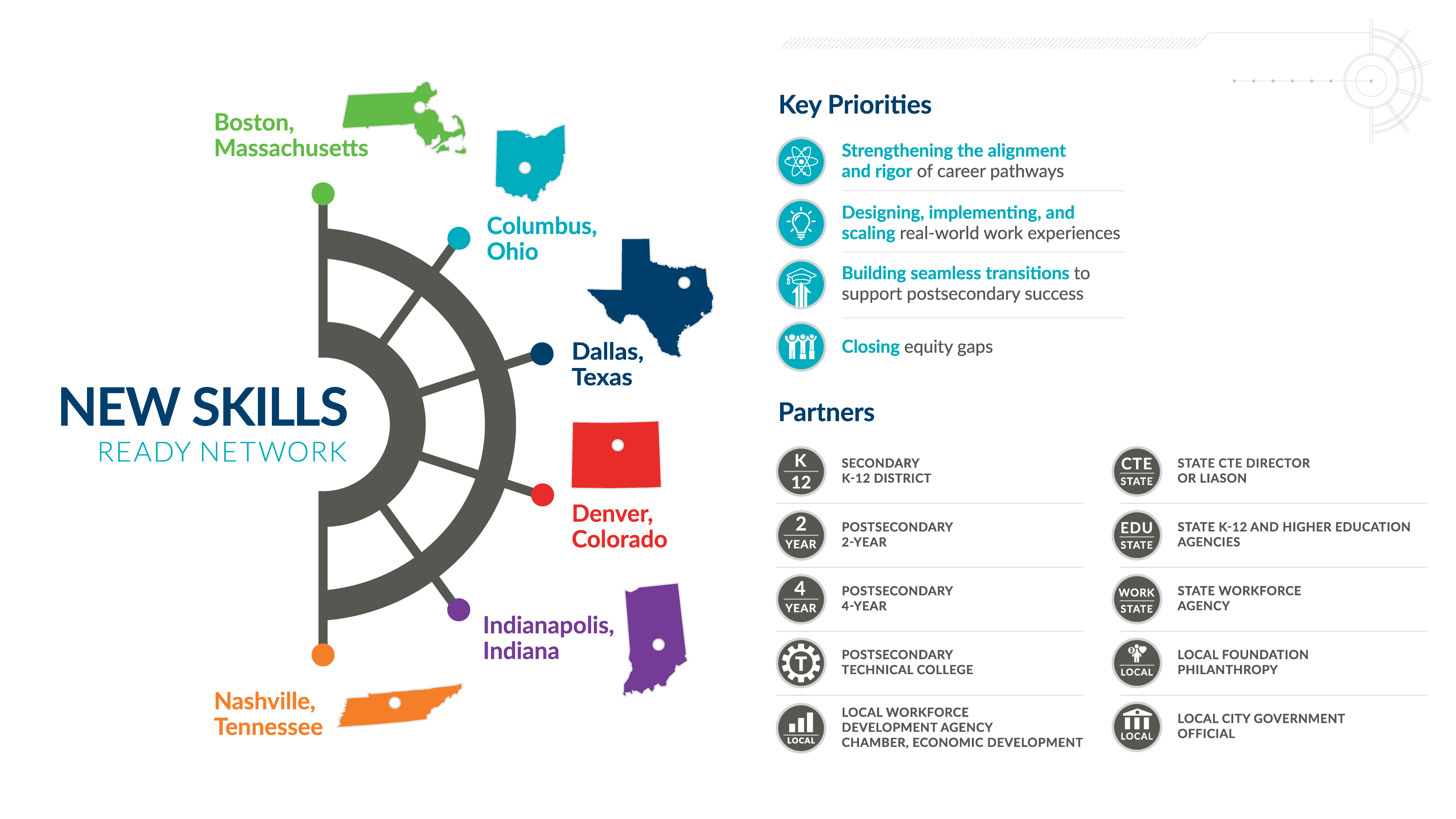 This week, a resolution was introduced in the House to double the federal investment in Career Technical Education (CTE). Read below to learn more about this bill, as well as how to advocate for CTE and workforce development programs in the current budget reconciliation process, next steps for a dual enrollment experimental site, the second round of emergency connectivity fund applications and a new guide on leading conversations and work that address racial inequities in CTE.
This week, a resolution was introduced in the House to double the federal investment in Career Technical Education (CTE). Read below to learn more about this bill, as well as how to advocate for CTE and workforce development programs in the current budget reconciliation process, next steps for a dual enrollment experimental site, the second round of emergency connectivity fund applications and a new guide on leading conversations and work that address racial inequities in CTE.
House Representatives Introduce Resolution to Double Federal Funding for CTE
On Wednesday, Representatives Raja Krishnamoorthi (D-IL) and Jim Langevin (D-RI) introduced a resolution to double federal funding for CTE. Specifically, the resolution calls for $10 billion over the next 10 years in new funding for programs under the Strengthening Career and Technical Education for the 21st Century Act (Perkins V) and innovative evidence-based CTE. The resolution calls attention to the important role of Perkins V and CTE in training the skilled workforce of the future and increasing earning potential and career opportunities. It also points to the insufficient amount of Fiscal Year 2021 (FY21) federal funding for CTE, which will not fully support the long-term economic realignment and skills training the country is facing.
Advance CTE is pleased to endorse this bill. The full resolution text can be found here.
House Moves Ahead with Budget Reconciliation – Your Advocacy is Needed
Written by Jori Houck, Media Relations and Advocacy Associate, Association for Career and Technical Education (ACTE). Original post can be found here.
Following the passage of a budget resolution by the House and Senate, the House Committee on Education and Labor and the Senate Health, Education, Labor and Pensions (HELP) Committee will begin drafting their portions of the larger budget reconciliation package. At this stage of the process, the key funding decisions for CTE are being made by members of these committees.
The Biden Administration has proposed $10 billion over 10 years for CTE programs in the reconciliation bill as a part of the President’s Fiscal Year 2022 budget request and American Jobs Plan. More broadly, the Biden Administration is calling for $100 billion in funding for workforce development. However, amidst competing priorities and limited resources available for education spending in the bill, these funds may not be included. In addition, there are numerous discussions underway about how to provide up to two years of free college through the bill, and how to support postsecondary retention and completion. Advance CTE and ACTE are proactively working to ensure that CTE programs at area CTE centers and certificate programs at other institutions are included in any of these proposals.
The House Education and Labor Committee is expected to begin considering its portion of the budget reconciliation package as soon as Thursday, September 9, and is putting that proposal together now. The Senate HELP Committee is expected to follow soon after, so now is the time to act!
ACTION NEEDED:
CLICK HERE to ask your Members of Congress to weigh in with their colleagues on the Senate HELP Committee and House Education and Labor Committee to ask them to support these three priorities in the budget reconciliation bill:
- Include the Biden Administration’s proposed investment of $10 billion over 10 years for CTE programs;
- Match the Biden Administration’s $100 billion request for workforce development funding overall, including CTE funding; and
- Ensure that CTE programs are included in any postsecondary proposals, such as free college and college retention and completion initiatives, including programs at area CTE centers.
ED Ends Dual Enrollment Experimental Sites Initiative
This month, the U.S. Department of Education (ED) notified over two dozen higher education institutions that are part of the ED Pell Experimental Sites Initiative for dual enrollment that the experiment will be finished at the end of 2021-2022 academic year. Next, the dual enrollment Pell experiment will be evaluated and a report will be submitted to Congress analyzing the data collected and offering policy recommendations for future initiatives to increase Pell grants to dual enrollment.
FCC Opens Second Application Window for Emergency Connectivity Fund
The Federal Communications Commission (FCC) announced that it has received $5.137 billion in requests to fund 9.1 million connected devices and 5.4 million broadband connections, including schools and libraries in both rural and urban communities, as part of the $7.17 billion Emergency Connectivity Fund Program. The first filing window closed on August 13, and resulted in applications from all 50 states, D.C., American Samoa, Guam, Northern Mariana Islands, Puerto Rico and the U.S. Virgin Islands. The FCC will open a second application filing window from September 28 to October 13 in light of the outstanding demand. A state-by-state breakdown of funding requests can be found here.
Senators Ed Markey (D-MA) and Chris Van Hollen (D-MD) and Representative Grace Meng (D-NY) highlighted this widespread demand in a press release that called for passing of the Securing Universal Communications Connectivity to Ensure Students Succeed (SUCCESS) Act, which was introduced in July.
Advance CTE Releases Guide to Engaging in Work on Racial Equity and CTE
Historically, CTE has systematically upheld barriers to each learner accessing and being successful in the career preparation ecosystem. With Without Limits: A Shared Vision for the Future of Career Technical Education and Perkins V placing an intentional focus on historically minoritized communities and learners with special population status, state CTE leaders have a responsibility to engage in anti-racist conversations between all levels of stakeholders to advance equitable CTE policies and practices. This week, Advance CTE released Brave Dialogues: A Guide to Discussing Racial Equity in Career Technical Education to provide tools to become better equipped and motivated to begin and continue in discussions to right the wrongs in CTE and to support state CTE leaders in creating an environment in which their state teams, local intermediaries, business partnerships and more have the language and comfort to discuss challenges and opportunities related to racial equity in CTE.
This new resource is a part of the Making Good on the Promise Series confronting the negative aspects of CTE’s legacy and defining the key challenges learners face today.
View Brave Dialogues: A Guide to Discussing Racial Equity in Career Technical Education here.
Meredith Hills, Senior Associate for Federal Policy
 As educators, can we influence the world 10,000 years from now?
As educators, can we influence the world 10,000 years from now?


 My name is Allie Pearce, and I am so excited to join Advance CTE as the 2021-2022 Graduate Fellow, helping to advance the organization’s federal policy priorities and initiatives. My work will be anchored in the organization’s
My name is Allie Pearce, and I am so excited to join Advance CTE as the 2021-2022 Graduate Fellow, helping to advance the organization’s federal policy priorities and initiatives. My work will be anchored in the organization’s  This week, funding legislation moves through Congress to avoid a government shut down. Read below to learn about the next steps needed, as well as Advance CTE’s support of proposed funding for Career Technical Education (CTE), newly announced awards for exemplary CTE programs and the first wave of grants to close the homework gap.
This week, funding legislation moves through Congress to avoid a government shut down. Read below to learn about the next steps needed, as well as Advance CTE’s support of proposed funding for Career Technical Education (CTE), newly announced awards for exemplary CTE programs and the first wave of grants to close the homework gap. 
 By the Numbers
By the Numbers  CTE Without Limits is approaching the evaluation and implementation phase that will occur over the next several years to be realized. Advance CTE looks forward to the release of a roadmap tool next month that provides guiding questions, rankings and action plans for states to evaluate vision alignment across one or all principles. The tool is designed to meet each state at each stage and capacity for vision implementation, and additional opportunities will be available for states interested in conducting deeper implementation work.
CTE Without Limits is approaching the evaluation and implementation phase that will occur over the next several years to be realized. Advance CTE looks forward to the release of a roadmap tool next month that provides guiding questions, rankings and action plans for states to evaluate vision alignment across one or all principles. The tool is designed to meet each state at each stage and capacity for vision implementation, and additional opportunities will be available for states interested in conducting deeper implementation work.